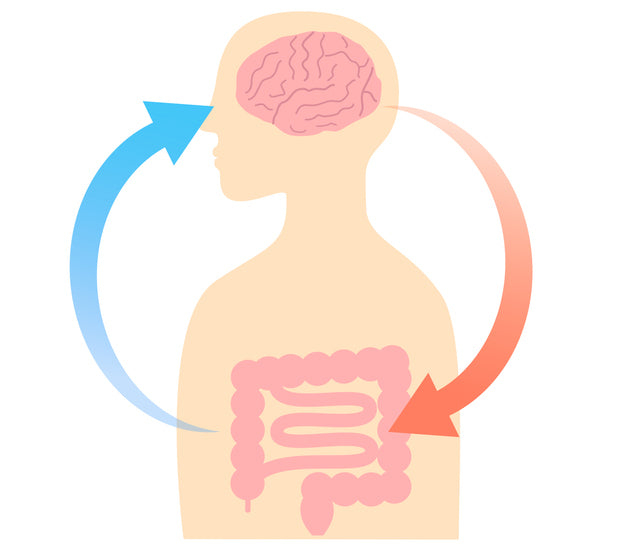
Intestine and chronic inflammation
Your gut bacteria play an exciting role in regulating inflammatory processes in the body. Scientific studies show that the composition of your gut flora can have a significant impact on your immune system .
In people with chronic inflammation, the bacterial diversity in the intestine often differs from that in healthy individuals.
Certain strains of bacteria produce substances that can counteract inflammation, while others tend to have an inflammatory effect.
A balanced microbiome can therefore help regulate inflammation in the body. Although the exact connections are still being researched, these findings underscore the central importance of a healthy gut microbiome for overall well-being.

Gut and the psyche (gut-brain axis)
Certain bacteria in your gut are capable of producing substances that could affect your mood and mental well-being. For example, some of them produce neurotransmitters – chemical messengers that also play a key role in the brain. Scientists are currently investigating the extent to which these substances produced by bacteria can influence our emotions and even our behavior.
These findings provide exciting new insights into the close connection between gut health and mental health . They suggest that a well-maintained gut flora can benefit not only your digestion but also your mental balance.
Studies
-
PREBIOTICS: intestinal support
Source: British Journal of NutritionPrebiotics specifically promote the growth of health-promoting bacteria in the gut —particularly bifidobacteria. They improve stool quality, lower intestinal pH, and promote the production of short-chain fatty acids such as butyrate. Studies show that prebiotics can reduce infections and allergic reactions (e.g., atopic dermatitis) in infants and children . In adults, they contribute to better calcium absorption and possibly improve bone health. Prebiotics also have immunomodulatory effects and show potential in supporting intestinal and metabolic health.
-
PREBIOTICS: Positive influence on mental health
Source: National Library of MedicineA systematic review published in Frontiers in Psychiatry examined the effects of prebiotics on symptoms of depression and anxiety. The results showed that prebiotics exhibited a non-significant trend toward reducing depression symptoms. The authors suggest that targeting the gut microbiome may hold promise as a complementary approach to traditional pharmacological treatment in clinical practice.
-
PREBIOTICS : Improve cognitive performance
Source: Nature CommunicationsA study published in Nature Communications examined the effects of prebiotics on cognitive function in older twins, among others. The results showed that prebiotic intake improved cognitive performance but had no significant effect on muscle strength. This suggests that low-cost and readily available gut microbiome interventions have the potential to improve cognitive frailty in the aging population.
In addition, the published study found that people over 60 who consumed protein powder and prebiotics daily for just three months performed significantly better on memory tests than those who did not.
-
POSTBIOTICS: Preparations of inactivated microorganisms
The International Scientific Association for Probiotics and Prebiotics (ISAPP) defines postbiotics as " preparations of inactivated microorganisms and/or their components that confer a health benefit on the host ." These may include cell wall fragments, enzymes, short-chain fatty acids (e.g., butyrate), or other bioactive molecules. Unlike probiotics, postbiotics do not contain live bacteria, making them safer, especially for immunocompromised individuals.
-
POSTBIOTICS: Strengthening intestinal health
Postbiotics are increasingly becoming the focus of modern research. Recent studies demonstrate that they bind specifically to certain receptors of the gut-associated immune system—in a manner that is precisely tailored to their bioactive compounds. This precise interaction can play a crucial role in strengthening gut health and supporting the immune system.